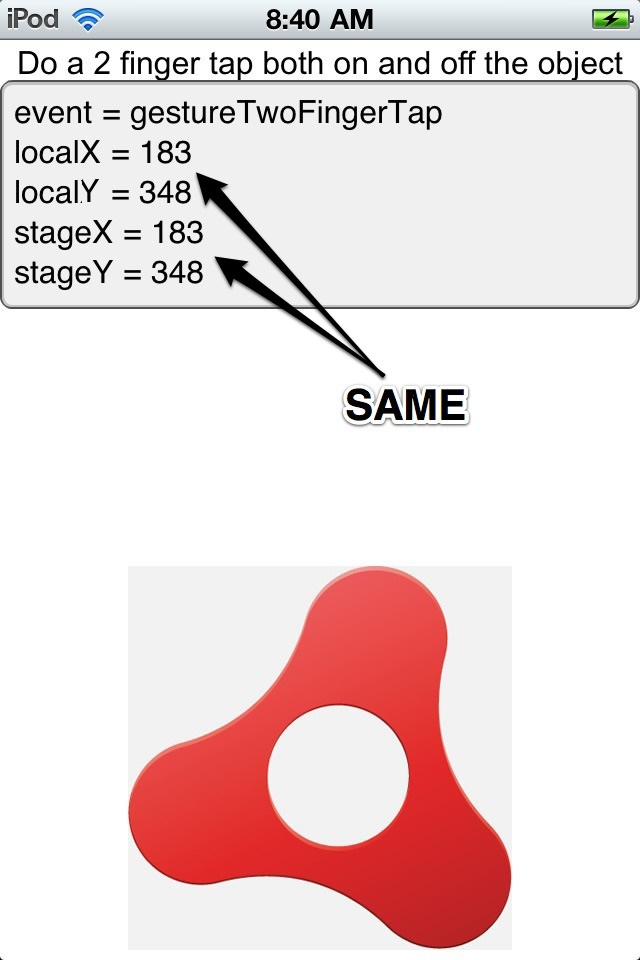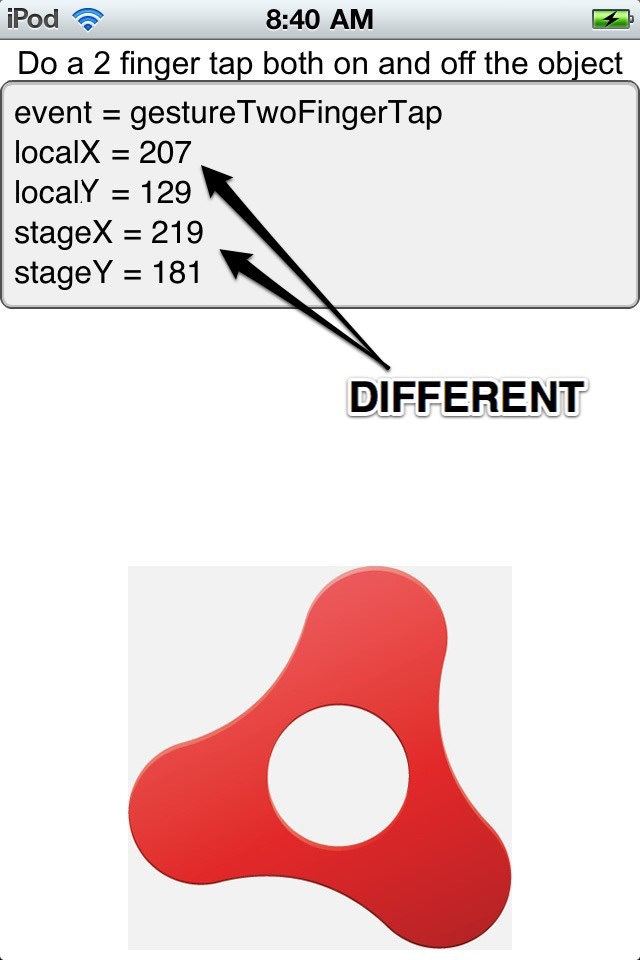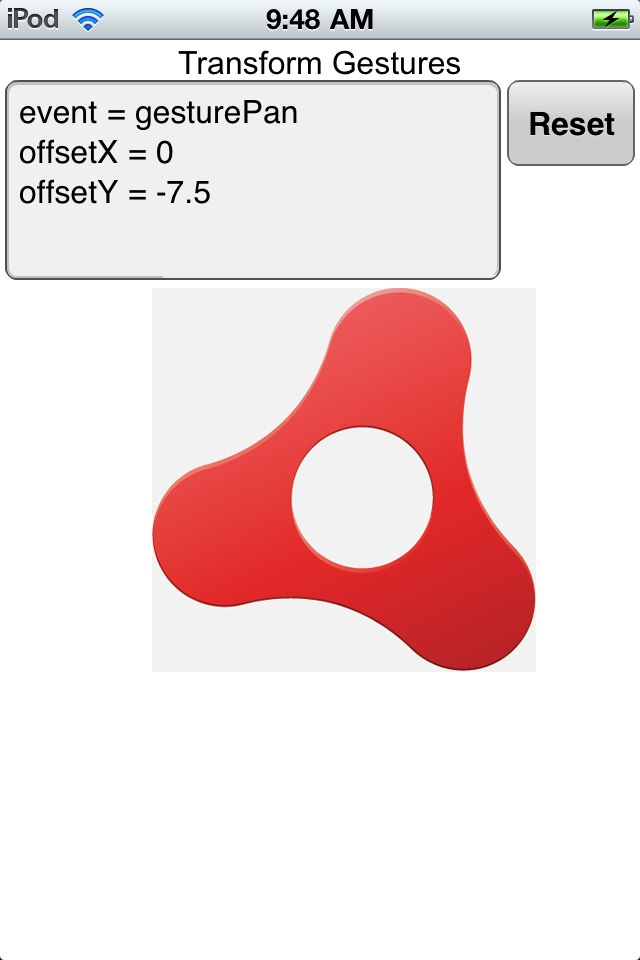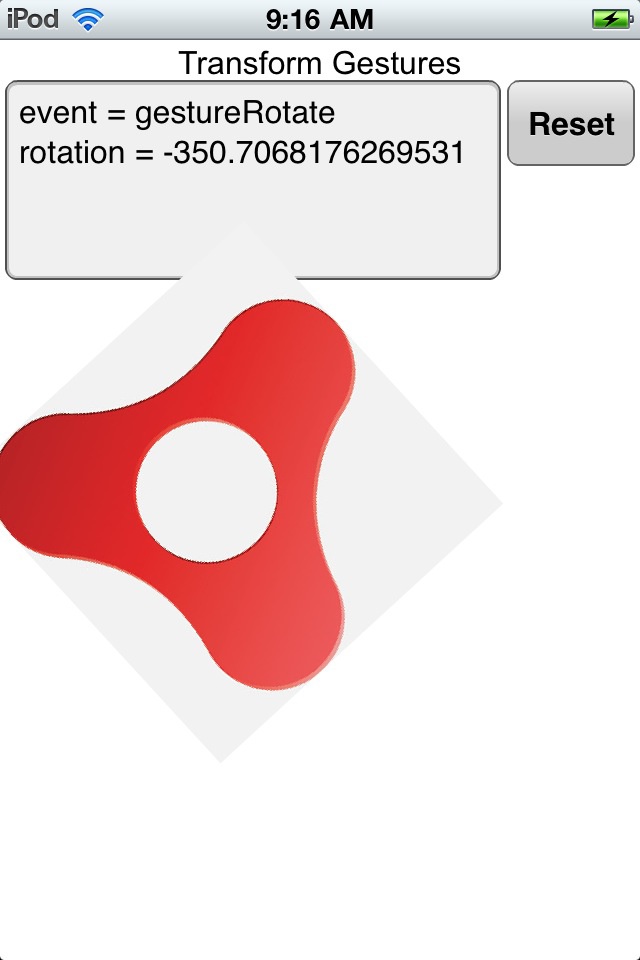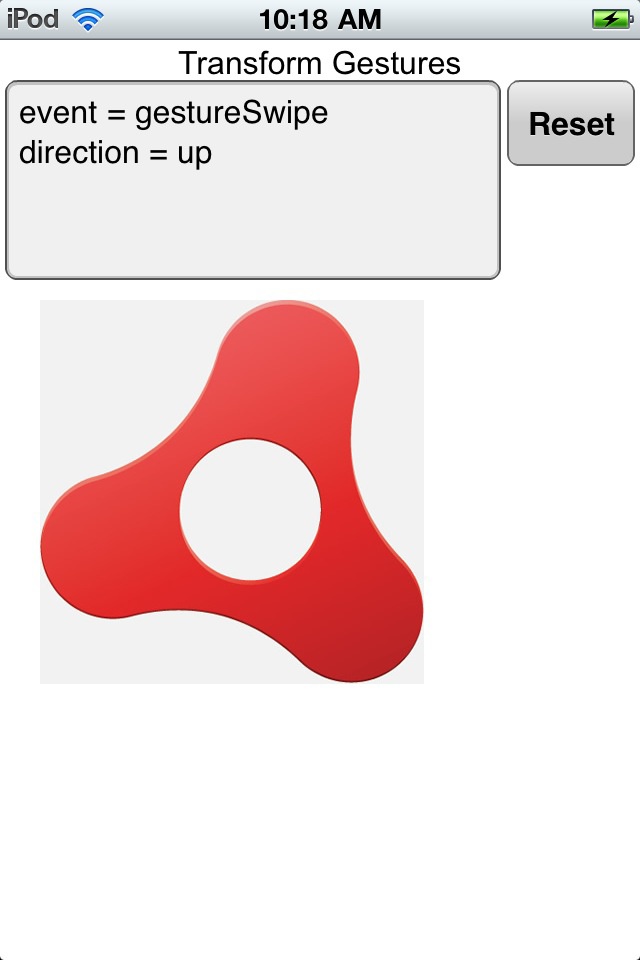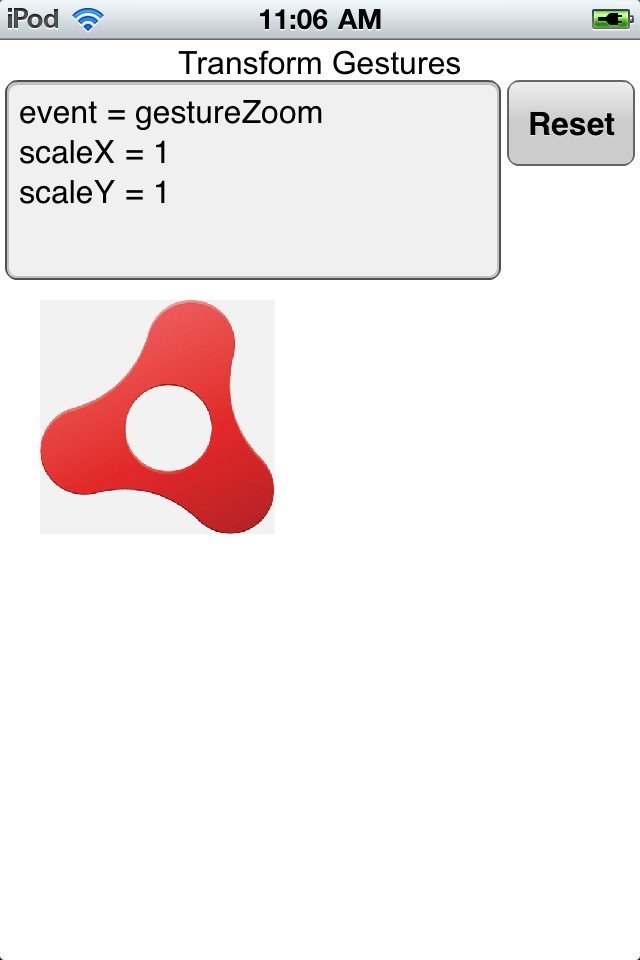One of the navigation methods that are unique to mobile devices is the ability to interact with an application via gestures on the device’s touch screen. Multitouch is defined as the ability to simultaneously register three or more touch points on the device. Within Adobe AIR 2.7, there are two event classes used to listen for multitouch events.
The GestureEvent class is
used to listen for a two-finger tap on the device. The event used to
listen for this action is the GESTURE_TWO_FINGER_TAP. This event will return
the registration points for the x and y coordinates when a two-finger
tap occurs, for both stage positioning as well as object
positioning.
Let’s review the code below. Within
applicationComplete of the application, an event
handler function is called which first sets
the Multitouch.inputMode to MultitouchInputMode.GESTURE. Next, it checks to see
if the device supports multitouch by reading the static property of the
Multitouch class. If this property returns as true,
an event listener is added to the stage to listen for GestureEvent.GESTURE_TWO_FINGER_TAP events.
When this event occurs, the
onGestureTwoFingerTap method is called. The
onGestureTwoFingerTap method will capture the
localX and localY coordinates, as
well as the stageX and stageY
coordinates. If you two-finger tap on an empty portion of the stage,
these values will be identical. If you two-finger tap on an object on
the stage, the localX and localY
coordinates will be the values within the object, and the
stageX and stageY will be relative
to the stage itself. See Figure 4-11 for
an example of a two-finger tap on the stage and Figure 4-12 for a two-finger tap on the
Adobe AIR image:
<?xml version="1.0" encoding="utf-8"?>
<s:Application xmlns:fx="http://ns.adobe.com/mxml/2009"
xmlns:s="library://ns.adobe.com/flex/spark"
applicationComplete="application1_applicationCompleteHandler(event)">
<fx:Script>
<![CDATA[
import mx.events.FlexEvent;
protected function application1_applicationCompleteHandler(event:FlexEvent):void {
Multitouch.inputMode = MultitouchInputMode.GESTURE;
if(Multitouch.supportsGestureEvents){
stage.addEventListener(GestureEvent.GESTURE_TWO_FINGER_TAP,
onGestureTwoFingerTap);
} else {
status.text="gestures not supported";
}
}
private function onGestureTwoFingerTap(event:GestureEvent):void{
info.text = "event = " + event.type + "\n" +
"localX = " + event.localX + "\n" +
"localY = " + event.localY + "\n" +
"stageX = " + event.stageX + "\n" +
"stageY = " + event.stageY;
}
]]>
</fx:Script>
<fx:Declarations>
<!-- Place non-visual elements (e.g., services, value objects) here -->
</fx:Declarations>
<s:Label id="status" text="Do a 2 finger tap both on and off the object"
top="10" width="100%" textAlign="center"/>
<s:TextArea id="info" width="100%" top="40" editable="false"/>
<s:Image width="384" height="384" bottom="10" horizontalCenter="0"
source="@Embed('adobeair.jpg')"/>
</s:Application>There are multiple transform gesture events available within AIR
2.7. Each will capture a unique multitouch event. The example below
demonstrates how to listen for GESTURE_PAN, GESTURE_ROTATE, GESTURE_SWIPE, and GESTURE_ZOOM events.
Let’s review the code below. Within
applicationComplete of the application, an event
handler function is called which first sets
the Multitouch.inputMode to MultitouchInputMode.GESTURE. Next, it checks to see
if the device supports multitouch by reading the static property of the
Multitouch class. If this property returns as true,
event listeners are added to the stage to listen for the TransformGestureEvent.GESTURE_PAN, TransformGestureEvent.GESTURE_ROTATE, TransformGestureEvent.GESTURE_SWIPE, and
TransformGestureEvent.GESTURE_ZOOM
events.
When a user grabs the object with two
fingers and drags the object, the TransformGestureEvent.GESTURE_PAN event is
triggered and the onGesturePan method is called.
Within the onGesturePan method, the
offsetX and offsetY values of this
event are written to the text property of the
TextArea component. Adding the event’s
offsetX and offsetY values sets
the object’s x and y, to move
the object across the stage. The results can be seen in Figure 4-13.
When a user grabs the object with two fingers and rotates the
object, the TransformGestureEvent.GESTURE_ROTATE event is
triggered and the onGestureRotate method is called.
Within the onGestureRotate method, the rotation value
of this event is written to the text property of the
TextArea component. To allow the object to rotate
around its center, the object’s transformAround
method is called and the event’s rotation value is added to the object’s
rotationZ value. The results can be seen in Figure 4-14.
When a user swipes across the object with one finger in any
direction, the TransformGestureEvent.GESTURE_SWIPE event is
triggered and the onGestureSwipe method is called.
Within the onGestureSwipe method, the value of the
event’s offsetX and offsetY are
evaluated to determine which direction the user swiped across the
object. This direction is then written to the text property of the
TextArea component. The results can be seen in Figure 4-15.
When a user performs a “pinch and zoom” on the object with two
fingers, the TransformGestureEvent.GESTURE_ZOOM event is
triggered and the onGestureZoom method is called.
Within the onGestureZoom method, the value of the
event’s scaleX and scaleY written
to the text property of the TextArea component. The
scaleX value is then used as a multiplier on the
object’s scaleX and scaleY
property to increase or decrease the size of the object as the user
pinches or expands two fingers on the object. The results can be seen in
Figure 4-16:
<?xml version="1.0" encoding="utf-8"?>
<s:Application xmlns:fx="http://ns.adobe.com/mxml/2009"
xmlns:s="library://ns.adobe.com/flex/spark"
applicationComplete="application1_applicationCompleteHandler(event)"> <fx:Script>
<![CDATA[
import mx.events.FlexEvent;
protected function application1_applicationCompleteHandler(event:FlexEvent):void {
Multitouch.inputMode = MultitouchInputMode.GESTURE;
if(Multitouch.supportsGestureEvents){
image.addEventListener(TransformGestureEvent.GESTURE_PAN,
onGesturePan);
image.addEventListener(TransformGestureEvent.GESTURE_ROTATE,
onGestureRotate);
image.addEventListener(TransformGestureEvent.GESTURE_SWIPE,
onGestureSwipe);
image.addEventListener(TransformGestureEvent.GESTURE_ZOOM,
onGestureZoom);
} else {
status.text="gestures not supported";
}
}
private function onGesturePan(event:TransformGestureEvent):void{
info.text = "event = " + event.type + "\n" +
"offsetX = " + event.offsetX + "\n" +
"offsetY = " + event.offsetY;
image.x += event.offsetX;
image.y += event.offsetY;
}
private function onGestureRotate( event : TransformGestureEvent ) : void {
info.text = "event = " + event.type + "\n" +
"rotation = " + event.rotation;
image.transformAround(new Vector3D(image.width/2,image.height/2, 0),
null,
new Vector3D(0,0,image.rotationZ
+ event.rotation));
}
private function onGestureSwipe( event : TransformGestureEvent ) : void {
var direction:String = "";
if(event.offsetX == 1) direction = "right";
if(event.offsetX == −1) direction = "left";
if(event.offsetY == 1) direction = "down";
if(event.offsetY == −1) direction = "up";
info.text = "event = " + event.type + "\n" +
"direction = " + direction;
}
private function onGestureZoom( event : TransformGestureEvent ) : void {
info.text = "event = " + event.type + "\n" +
"scaleX = " + event.scaleX + "\n" +
"scaleY = " + event.scaleY;
image.scaleX = image.scaleY *= event.scaleX;
}
protected function button1_clickHandler(event:MouseEvent):void
{
image.rotation = 0;
image.scaleX = 1;
image.scaleY = 1;
image.x = 40;
image.y = 260;
info.text = "";
}
]]>
</fx:Script>
<fx:Declarations>
<!-- Place non-visual elements (e.g., services, value objects) here -->
</fx:Declarations>
<s:Label id="status" text="Transform Gestures" top="10" width="100%"
textAlign="center"/>
<s:HGroup width="100%" top="40" left="5" right="5">
<s:TextArea id="info" editable="false" width="100%" height="200"/>
<s:Button label="Reset" click="button1_clickHandler(event)"/>
</s:HGroup>
<s:Image id="image" x="40" y="260" width="384" height="384"
source="@Embed('adobeair.jpg')"/>
</s:Application>Get Developing iOS Applications with Flex 4.5 now with the O’Reilly learning platform.
O’Reilly members experience books, live events, courses curated by job role, and more from O’Reilly and nearly 200 top publishers.
